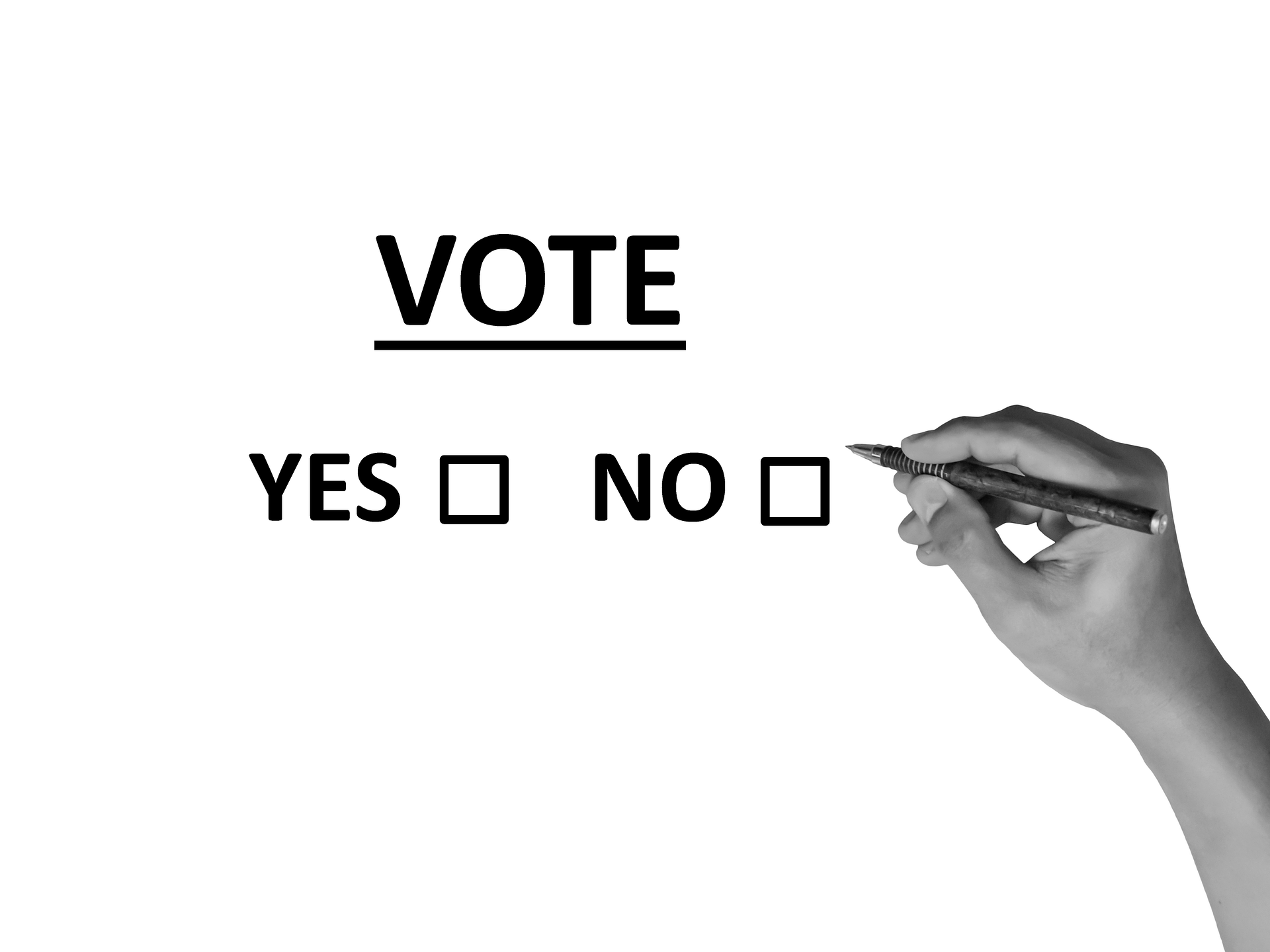For added support, just chuck a ‘Rock’ at it.
Years ago, before the introduction of social media, we all relied on the information provided to us by media outlets like television, tabloid, newspapers, radio and the like to help us understand the world and form our opinions. In the present day, the reliance on these regulated forms of media may still be important in the formation of public opinion, particularly with the older generations, however it appears that social media has introduced an immediate two-way conversation between celebrities and their fans that never existed until recently; a type of democratisation of a fan club in real-time.
Celebrities crossing over from their usual world of popularity into the political sphere to use their huge fan-base to help influence the outcome of an upcoming election or even to simply make a political statement, is not uncommon.
Marlon Brando in 1973, was nominated for Best Actor for his performance in The Godfather. In his stead, he sent Native American activist Sacheen Littlefeather. In protest against the long-standing failure for the USA to honour the treaties it had made with Native American nations and as a proclamation against the stereotypical portrayal of Native Americans in TV and film, she refused the award on Marlon’s behalf. Before this, politics had been pretty much left out of the Oscars, and worryingly for The Academy, on the night, Sacheen’s words were met with a mixture of booing and applause.
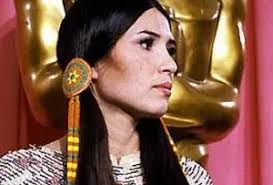
This show of ‘political shenanigans’ prompted the Academy, who were fearing a PR disaster, to ban any future award recipients from sending proxies on their behalf. There have been many other occasions where outside politics have taken centre stage at the Oscars. Who can forget Tim Robbins and Susan Sarandon in 1993, and the fine performance of Michael Moore in 2003. Yes, not exactly politics as such, but certainly showing how one human can have a strong influence on matters.
Meanwhile in politics
In 1966, an actor who starred in such films as ‘The Bad Man’ called Ronald Regan was elected Governor of California and later became the President of the United States. Moving through the years, in 2008, Oprah Winfrey and George Clooney openly and loudly endorsed Barack Obama’s presidential campaign; as of yet, neither of them have opted run for President, but who knows? During the same campaign, American musician Hank Williams Jr chose to write a song, endorsing Senator John McCain’s campaign.
Chucking A ‘Rock’ At The Election
Recently, on Sunday, Sept. 27 2020, The Rock, a man who certainly knows how to spin his own PR, decided to post a video on Instagram that was far different from anything he had posted before. In his own words, “it expressed a message near and dear to my heart”. He wanted his followers “to vote blue in the 2020 election”. So with an audience of 190 million, he officially endorsed former VP Joe Biden and his running mate, Senator Kamala Harris.
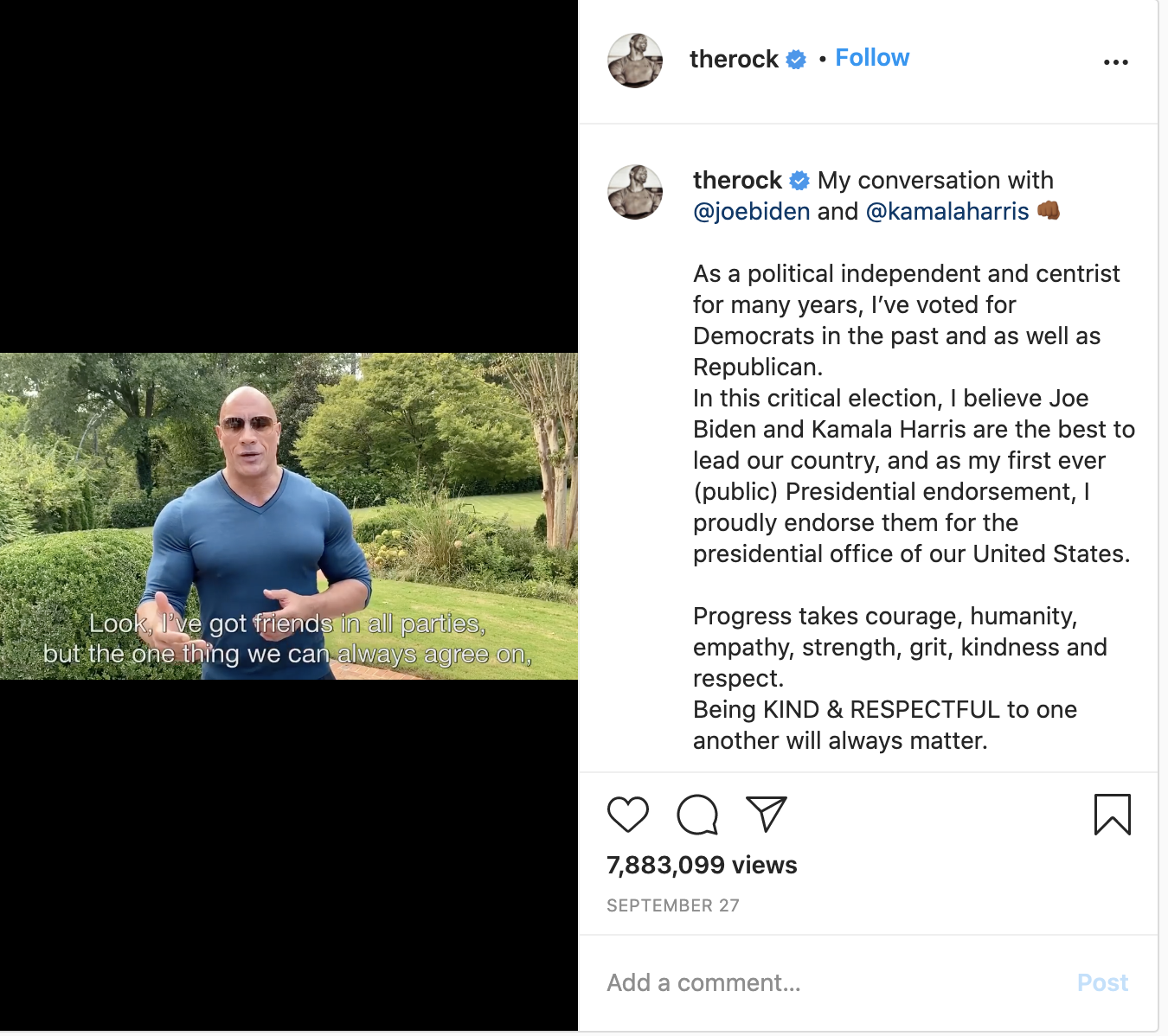
His caption read “As a political independent and centrist for many years, I’ve voted for Democrats in the past and as well as Republican. In this critical election, I believe Joe Biden and Kamala Harris are the best to lead our country, and as my first ever (public) Presidential endorsement, I proudly endorse them for the presidential office of our United States.” At the time of the post, The Rock had 198 million followers on Instagram, and with him rumoured to earn up to $1 million per sponsored Instagram post, he has a lot sway in the world of social media.
“it expressed a message near and dear to my heart”
Prior to this post, when The Rock posted content, his millions of adoring fans would applaud him with nothing but kind words and platitudes, however this post changed everything.
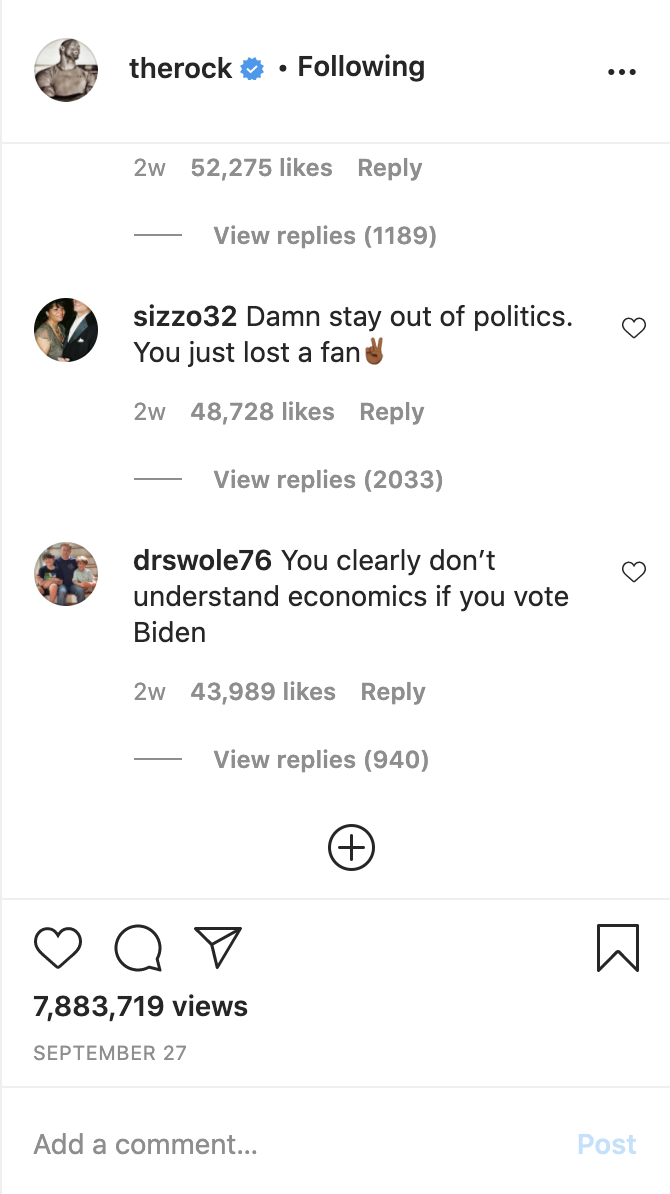
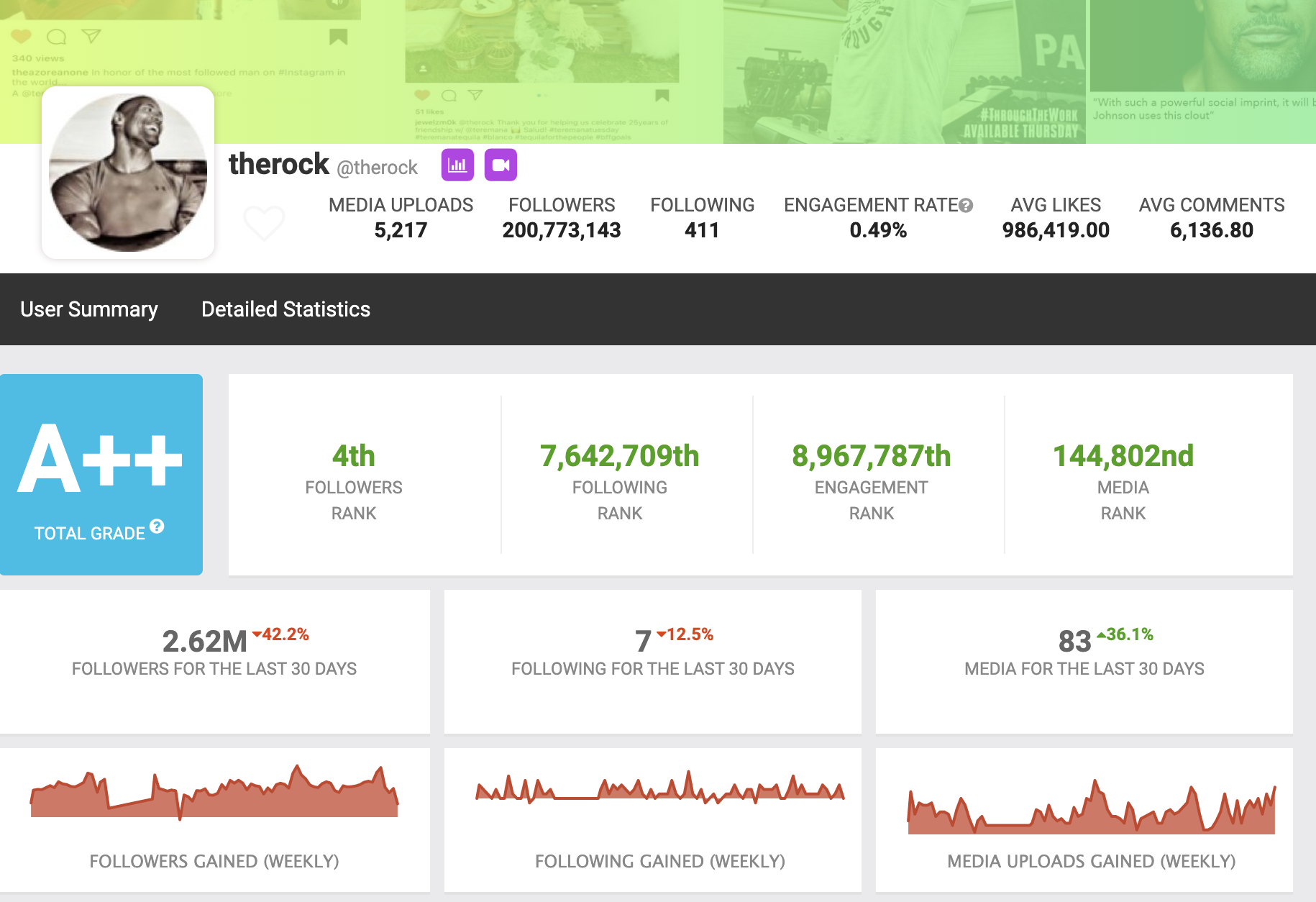
Many Trump fans took to his account to leave their comments of dislike, and to praise their man-child of a President. Did it harm his account?
Actually no. It has grown even more, to well over 200 million. So exactly how can we define that success? In votes? In followers? Just how influential was his message in shaping the political landscape? It is near impossible to measure. It’s not like there are statisticians standing outside each polling station waiting to ask every voter questions like “which celebrity influenced your vote”?
Public attitudes.
A recent study by the YouGov-Cambridge Centre concluded that only 14% of British voters think social media is good for society.
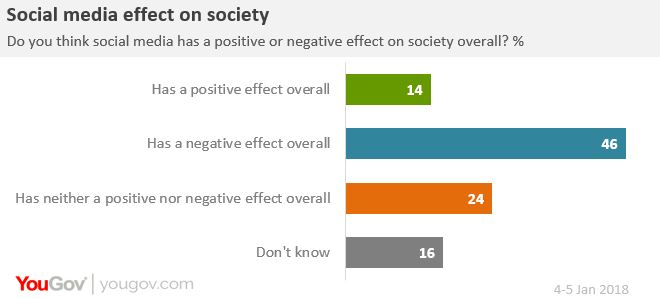
In the same study it shows clearly that many voters actually doubt the internet has been positive for political campaigning.
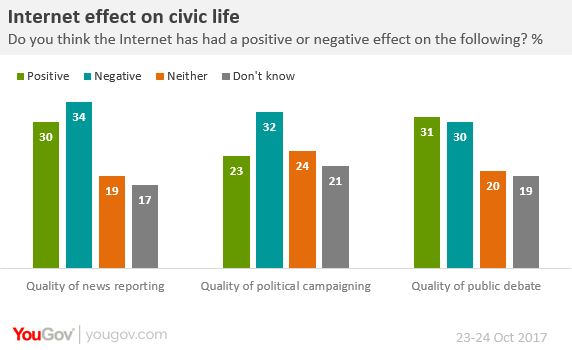
According to another recent study, the USA public attitudes toward political engagement on social media are equally as eye-opening. 42% get involved online with social or political issues that are important to them, while 37% feel that social media offers a place to express their political opinions.
I am not writing this with the suggestion that celebrities should be left out of all political discourse, however I do feel that in a world where celebrities with huge social media reach are role models and supposed policy experts, there is no limit to just much they can influence the shaping of public opinion; particularly with Generation Z.
What about the older citizens? Could older generations start using social media as an online activism tool? Professor Jen Shradie suggests “Online activism was supposed to be a utopian dream. Rather than rely on big institutions, everyone’s voices were supposed to be heard,” she says. She goes on to suggest that online activism tends to attract the younger generations to engage, not to mention the better educated; and those with the technology and communication skills do tend to get their point across to win online arguments. After all, older generations obviously hold opinions, but many of these may not be getting captured online.

So, could politically uneducated, yet powerfully influential PR astute celebrities like The Rock be seen as being a potentially dangerous combination in the overall process of forming social opinion within the political sphere? Perhaps, this is a conversation we should be engaging in more often.
Gary Gates is a final year BSc Communication Management and Public Relations student at Ulster University. He can be found on: LinkedIn – Gary Gates
